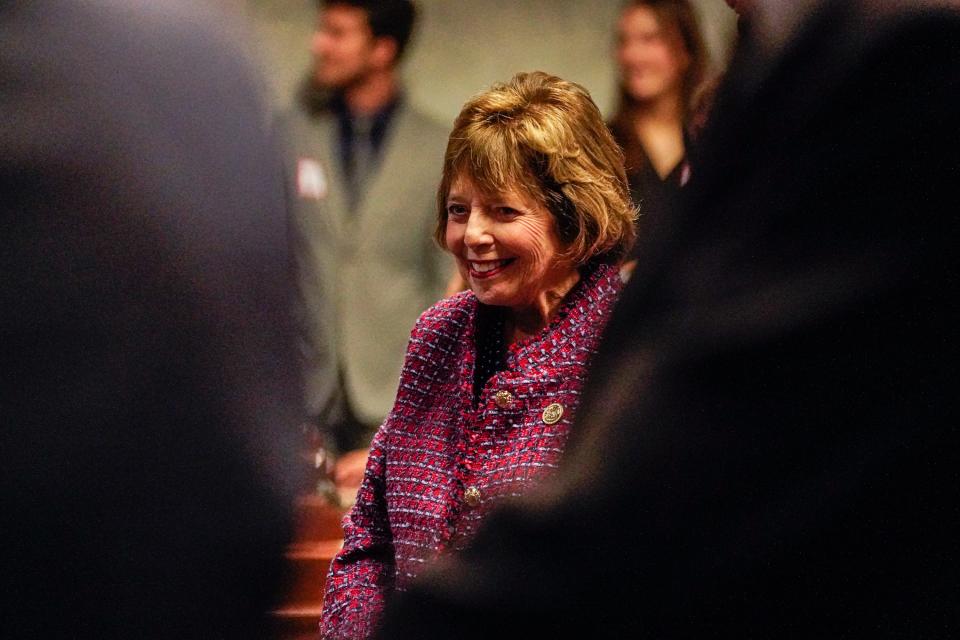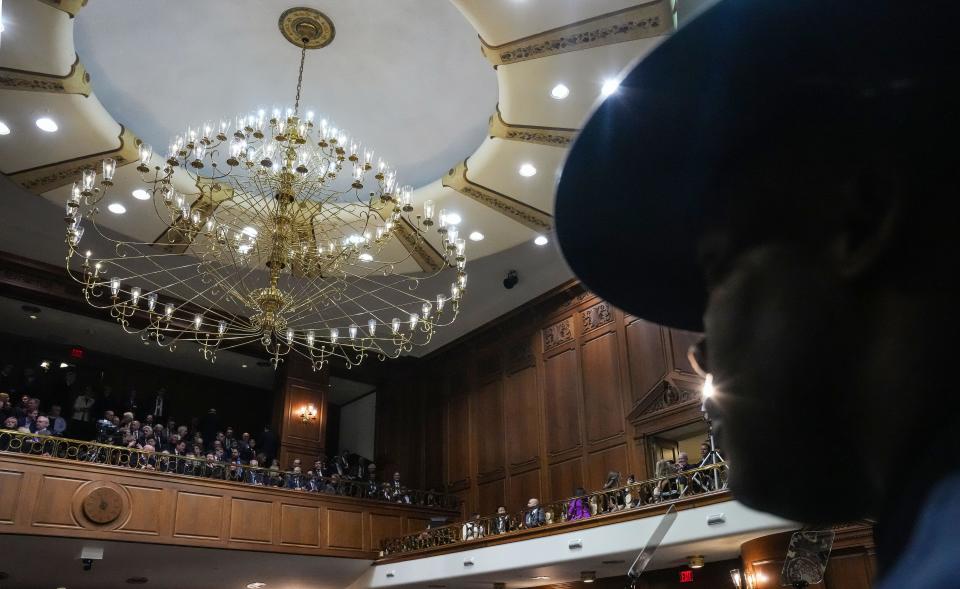An Indiana state senator could benefit from her bill easing child labor laws. Here's how
- Oops!Something went wrong.Please try again later.
An Indiana Republican leading a bill to ease some state child labor restrictions owns a business that could see benefits from the proposed legislation.
Senate Bill 146, authored by Sen. Linda Rogers, R-Granger, would expand work hours and time restrictions for young Hoosiers and allow 18-year-olds to serve alcohol in restaurants and hotels. Rogers and her husband own Juday Creek Golf Course, which is registered with the state's Department of Labor as a business that employs minors.
Ethics experts told IndyStar there's no clear answer as to whether the bill presents a conflict of interest. The potential connection between the bill and Rogers's business does point to the challenge, or benefit some might say, of having a part-time legislature, where lawmakers are in session in Indianapolis for only a few months every year and have other sources of income or jobs in their home communities, the experts said.
Indiana law requires lawmakers to submit statements of economic interest annually, which state business involvements and how they and their family members are employed.

Rogers, however, says the ability for lawmakers to carry legislation that applies to their professional interest helps them better serve their constituents.
In the House, state Rep. Kendell Culp, R-Rensselaer, who is the vice president of the Indiana Farm Bureau and owns a family farm, is carrying House Bill 1093, which passed the full House Monday on a vote of 66-31. The bill now heads to the Senate.
House Bill 1093 also expands working hours for minors and allows 16 and 17-year-olds to work in hazardous farm labor. Culp told IndyStar a constituent who runs a drive-in restaurant in his district brought the bill to him and that the provisions in this bill would not apply to Culp Family Farms.
Rogers, who built Juday Creek Golf Course in Granger with her husband 35 years ago, said the Indiana Restaurant and Lodging Association approached her about carrying Senate Bill 146.
“This is going to help anyone in the service industry,” Rogers told IndyStar. “Most teenagers work or when they have a job, they will work in the service industry. So I would just be one of the many many thousands that do this.”
Part-time legislature and ethics
Because the Indiana General Assembly is not a full time legislature, there is more opportunity for lawmaking and outside businesses or jobs to mix.
When session is over and the governor signs bills into law, state senators and representatives go back to their communities and resume outside jobs.
“Part of the reason governments have the part-time legislatures is they want people who have this outside experience and have a life outside of the political sphere to be involved in the decision making,” said Danielle Caputo, legal counsel on ethics for the nonpartisan Washington D.C.-based Campaign Legal Center. “It affects them in a way it doesn't necessarily if you are full time.”
Read the bills: These 2024 session bills would ease Indiana's child labor laws

Rogers said her individual business experience can help when forming laws. Additionally, she said her business experience with the golf course and history in the restaurant industry provides opportunities to relate to her constituents.
“I look at all my colleagues and they all come from different walks of life,” she said. “If there's a question that pertains to their particular industry, we look at them as the expert on how does this impact your industry?”
Jeff Dunn, director of The Prindle Institute for Ethics at DePauw University, said potential conflicts rise to a higher level depending on whether a bill is tied specifically to the role a legislator occupies.
For example, if a lawmaker were to draft a bill where his or her children directly benefit, it would be a clear-cut issue, Dunn said.
However, Dunn said conflicts are part of being in office, as many lawmakers carry expertise from previous or current occupations into draft legislation.
“I think that if you get rid of all conflicts of interest, it might not always have the best consequences,” Dunn said. “There's no great option sometimes.”
Rogers and the Granger golf course
Senate Bill 146, led by Rogers, passed out of the chamber’s Committee on Commerce and Technology last week. The bill is still waiting for a floor vote in the Senate.

Rogers's golf course could see a benefit from the expanded working hours for minors and a provision on allowing alcohol service in the bill. Senate Bill 146 allows 18-year-olds to ring up alcohol purchases and to serve alcohol in hotels or restaurants.
Rogers and her husband have a greater than $500,000 interest in Lindy's Inc, the registered name of the company that operates the Granger golf course, according to the senator's most recent statement of economic interest.
Her bill saw support from senators, business owners and young Hoosiers currently employed in restaurant jobs during the Senate committee hearing last week.
During the committee meeting, Rogers declined to remove the parts of the bill related to ringing up alcohol sales or serving alcohol after Sen. Andy Zay, R-Huntington, asked if she would consider eliminating it to protect young Hoosiers from alcohol exposure. Rogers told Zay the bill does not allow 18-year-olds to bartend and emphasized that restaurants need to be able to have staff members capable of multiple skills.
In an interview with IndyStar, Rogers acknowledged that Juday Creek Golf Course could benefit from the alcohol component of her bill. The golf course has a banquet hall customers can rent that provides food and beverage services, according to the course’s website.
Still, she said, any benefit would be minor.
“We serve minimal food to our guests that come to golf, but we'll do a lot of banquets,” Rogers said. “When we do, we always have a 21-year-old bartender on staff and they may take a drink to a table, but most often the bartender will deliver the alcoholic beverage. So that's not a significant part of our business. Golf and food is our business.”
Contact IndyStar's state government and politics reporter Brittany Carloni at brittany.carloni@indystar.com or 317-779-4468. Follow her on Twitter/X @CarloniBrittany.
Rachel Fradette is a suburban education reporter at IndyStar. Contact her at rfradette@gannett.com or follow her on Twitter at @Rachel_Fradette.
This article originally appeared on Indianapolis Star: Indiana GOP lawmaker could benefit from bills easing child labor laws

